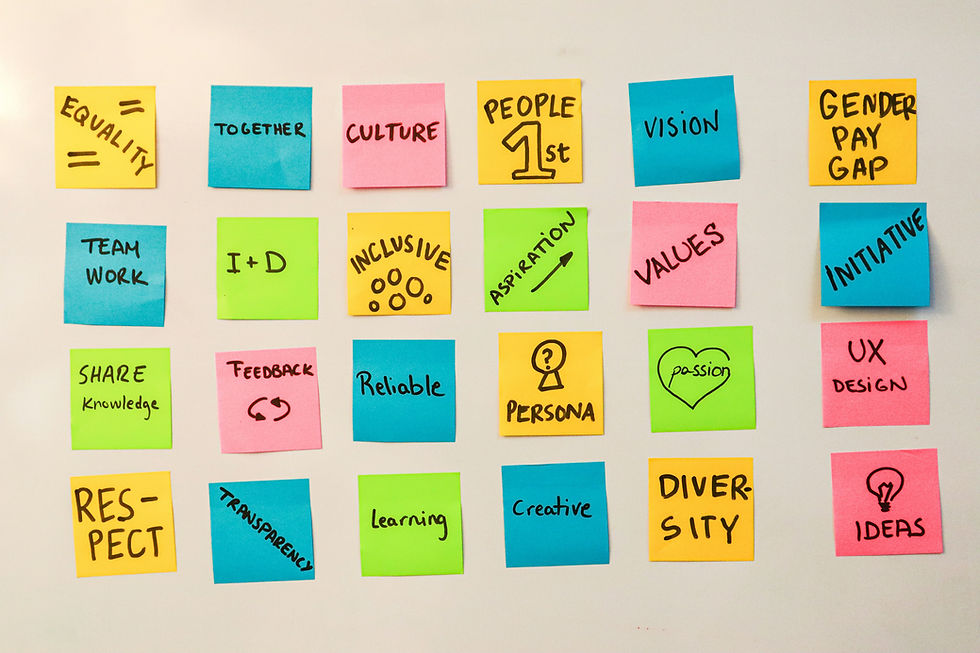Take control of stress
- helenjbutler
- Apr 19, 2018
- 3 min read

We’re all familiar with the negative effects of prolonged stress: it impairs your immune system and constricts your blood vessels, damaging your body and your relationships. But most people don’t go out of their way looking for stressful situations, so what can we do to protect ourselves when stress inevitably shows up?
Eating healthily, drinking plenty of water, limiting caffeine and alcohol, getting exercise, fresh air and good sleep will all help you to deal with stress more effectively. If you look after yourself you’ll be more able to cope with whatever life throws at you. But what else can you do?
When I coach people who are experiencing high levels of stress on a day to day basis, my approach is to deal with it in three ways:
1. Identify the root causes of stress and take clear steps to reduce them.
This may seem obvious but taking time out to do this is time well spent, however busy you are. You need to examine your daily habits and stressful situations and honestly answer the following questions:
How would your life improve if you weren’t so stressed?
What part(s) of your day do you find most stressful?
What do you/don’t you have control over?
What 5 things could you do to reduce your general stress levels?
You can’t control everything, but there are always factors that cause you stress like time keeping, difficult relationships, preparation and prioritization that you can make a focused effort to improve.
It’s also important to differentiate between bad stress and good stress. Good stress that we might feel before an important meeting injects us with adrenalin and enables us to stretch ourselves and grow, and bad stress places us in our panic zones, which if we go into too often, will make us ill.
Think of your stress response as helpful. Heart pounding, breaking a sweat, and shaking are all signs that your body is primed for action and is exactly what happens to your body in times of intense joy and courage too. Trust that your body knows what it’s doing; it’s helping you to rise to the challenge. Sometimes just shifting our mindsets into thinking about things differently can make us feel instantly stronger and more resilient.
2. Notice your own negative and angry thoughts as a result of stressful situations. Stop them and ask for help instead.
We’re essentially pack animals and if one person is stressed, it will travel through the whole pack/workplace. This goes back to the days when an individual thinks they hear a predator coming and alerts the whole pack – we all become paranoid, jumpy and ready for danger. If this is your workplace then you may need to think about not only your own stress levels but also about those of the people around you.
There’s also a difference between feeling stress and showing others that we’re feeling stress. We actually give ourselves permission to behave in a stressed way, usually because we want people to recognise that we’re feeling stressed. This is counterproductive, as it’s us that we hurt; both with the physical effects of the stress and the damage that we then do to our relationships.
Asking for help is a much healthier way of letting others know that we’re feeling the strain and it also has a biological benefit, as oxytocin is released as well as cortisol in times of stress. This is the ‘cuddle hormone’ and helps your body to heal from stress damage.
You can encourage more oxytocin to be released by seeking help from others in times of stress, as well as physical touch – shaking hands, hugs etc. Oxytocin works by increasing the bonds between people and is released not only in the person seeking help, but also in the person giving help. We’re social animals and we need to rely on each other to function properly. It’s not a sign of weakness to ask for help, it’s essential for us to survive. Teams need to behave like teams and support each other so everyone can perform better.
3. Identify what activities relax you and then schedule those things into your weekly schedule.
This essentially boils down to two questions:
1. What activities and people relax you? (this should not be centred around booze or other unhealthy props!)
2. How can you build more of these into your working week?
There are lots of other techniques that may help you when you’re feeling the stress hormones kicking in: deep breathing, positive affirmations (I repeat ‘I’ve got this’ to myself when I’m feeling my heart pounding), visualisation and meditation can all make major differences to your ability to handle stressful situations.
I hope this gives you the impetus and ideas you need to manage your stress. If you'd like to have a chat about how I could help you and/or your team to live and work better, please do get in touch.







Comments